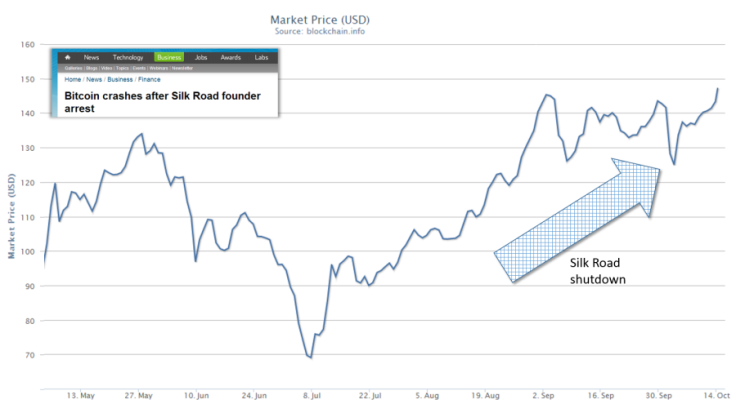Bitcoin - the Virtual Currency Facilitating Cybercriminals, Hitmen and Drug Dealers
The shutting down of Silk Road may have impacted the value of Bitcoin momentarily, but it is here to stay and help facilitate cybercrime.

If Al Capone were alive today, he would using Bitcoins to hide his ill-gotten gains from the Internal Revenue Service.
That, at least, is the opinion of the current head of the Interal Revenue Service's criminal investigation division Richard Weber, who has seen Bitcoins and other virtual currencies facilitate criminals around the world, not only to hide the proceeds of criminal activity but to allow them offer services like contract killing direct to their customers without the worry of being identified.
And while the IRS, the FBI and other law enforcement agencies have had some success in shutting down some of these criminal services, the simple fact remains that virtual currencies are here to stay.
In a newly published report entitled Digital Laundry, security company McAfee concludes:
"Virtual currencies will not go away. Despite the apparent challenges posed by DDoS attacks, the use of these exchanges for money laundering, and the facilitation of cybercrime, opportunities also abound for legitimate uses. Ignoring this market opportunity is likely to cost potential legitimate investors significant revenue, but failure to address the potential risks may cost a lot more."
Silk Road
On 1 October the FBI announced to the world that it had shut down the notorious Silk Road website, which offered visitors a menu of drugs, firearms and other illegal products for sale. As well as using the Tor network to protect the anonymity of buyers and sellers, the online bazaar only dealt in Bitcoins, the virtual currency-du-jour which makes it difficult for anyone to trace transactions across the globe.
While the close of Silk Road had an immediate negative effect on the value of Bitcoins, you can see in the graph below that the value has now recovered and one Bitcoin worth more now than it was prior to the Silk Road seizure.

This reflects what has been happening in the virtual currency world ever since the e-gold was established in 1996.
E-gold, WebMoney and Liberty Reserve
The forerunner for today's virtual currencies, e-gold quickly became the favoured location for cybercriminals looking to launder their proceeds thanks to the fact no verification of identity was needed in order to sign-up.
By 2005 e-gold had drawn the attention of the US secret service and the FBI both of whom raided its offices, but the service continued to grow, with a suspected three million users by the end of 2006. As the law enforcement agencies closed in, cyber-criminals saw the trouble coming and migrated en masse to WebMoney.
WebMoney was established in 1998 and a decade later had a customer base of five million - mostly thanks to those migrating from e-gold. But, just like e-gold, WebMoney lost most of its underworld customers all at once, this time due to a change in modification of practices in 2010.
It was Liberty Reserve, established in 2006, which was the beneficiary of the latest change of heart among the cybercriminal fraternity. While it experienced rapid growth, in May of this year the service was shut down and founder Arthur Budovsky charged with money laundering as well as operating an unlicensed money transmitting business.
Unregulated, instant and anonymous
It is easy to see why virtual currencies appeal to cybercriminals. They are unregulated, instant, easy to use and anonymous.
However it is the emergence of Bitcoin, in conjunction with the development of the deep web, which has seen virtual currencies not only used to launder money but to now offer criminal products and services direct to those who are looking for them.
Just as one virtual currency service will replace another, so one anonymous drugs marketplace will replace Silk Road. Or to be more accurate, many drugs marketplaces will replace Silk Road.
Hitman Network
While some will be put off by the arrests carried out in the wake of the shutting down of the Silk Road website, it is likely that many more will be intrigued by Silk Road's success ($1.2 billion in revenue over two-and-a-half-years) and will believe they can do better.
Already it is (relatively) easy to find portals on the Tor network which give you access to all products and services which would traditionally have only been available down a dark alley.
The Hitman Network for example offers access to three "contract killers" who will kill a target in exchange for some Bitcoins. The only exceptions these contract killers impose is that they will not kill any target under 16 and no top 10 politicians.
Of course there is no way of confirming if the contract killers on offer will actually carry out a hit without spending a lot of money, but as MacAfee point out, it demonstrates a "confidence in the privacy of virtual currencies has enabled the sale of some frightening services."
While the Elliot Ness of Cyberspace, FBI Special Agent Christopher Tarbell, may have shown categorically that no one is safe even on the deep web, the emergence and resilience of Bitcoins could suggest that this is a virtual currency that is here to stay - and that can only be good news for cybercriminals.
© Copyright IBTimes 2025. All rights reserved.





















